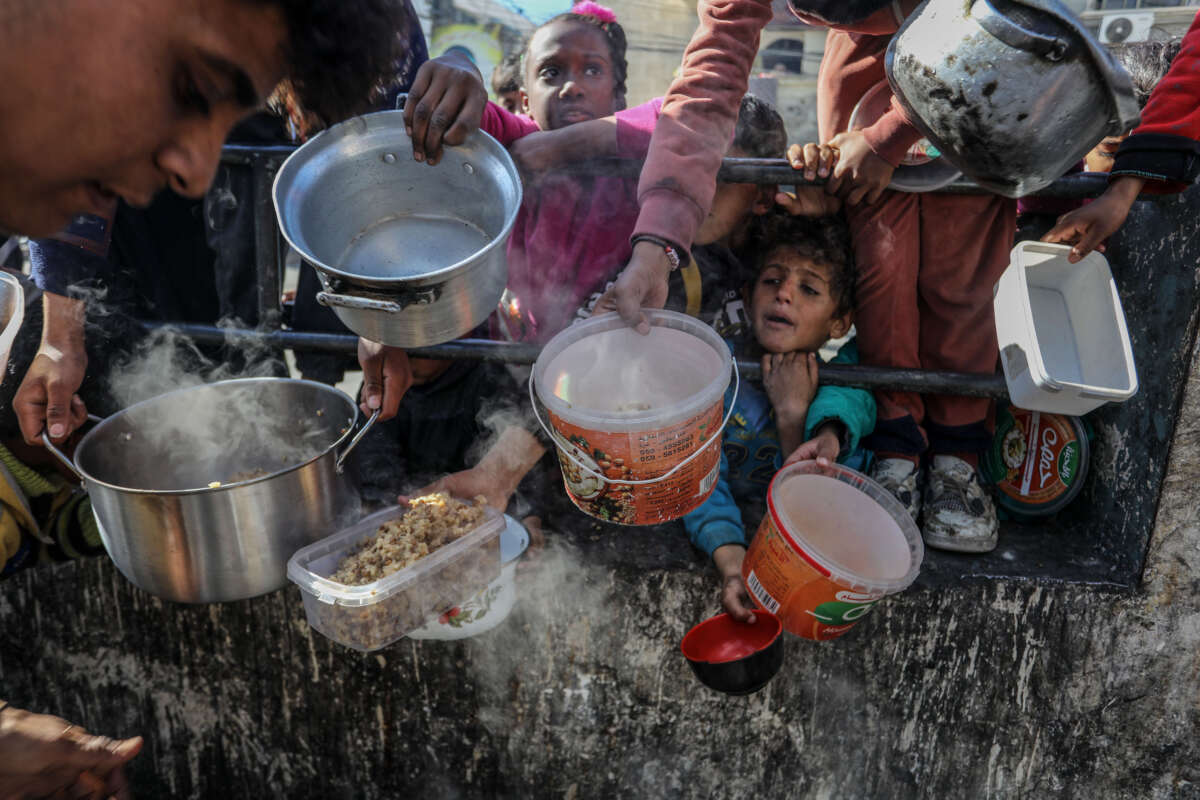Israel’s campaign to starve Palestinians in Gaza en masse is causing the worst hunger and famine crisis since World War II, a famine expert has said.
World Peace Foundation executive director and hunger researcher Alex de Waal said in an interview with Al Jazeera this week that, having studied famines across the world for decades, he’s found that “nothing is comparable” to the crisis Israel has created in Gaza in modern times.
“Nothing is comparable in terms of the speed and the concentrated effort at destroying what is essential to sustain the life of people — nothing compares to Gaza over the last 75 years. The speed of deterioration of humanitarian conditions is absolutely terrifying,” de Waal said.
He went on to say that Israel’s actions in Gaza are “undoubtedly” in violation of the International Court of Justice’s (ICJ) order for Israeli forces to increase humanitarian aid to Gaza and take steps to prevent further killing of Palestinians.
“There’s no doubt that certain senior members of the Israel government and certain groups within Israeli society have the intent of starving Gaza,” de Waal continued. “What we know now is that they are knowingly pursuing military actions in the full knowledge that this will be the outcome.”
Israeli forces have been blocking food, water and other basic necessities from entering Gaza for months now, and have recently intensified those efforts by blocking all humanitarian aid from entering the region, some aid workers say. This has created horrific circumstances for Palestinians, with people reporting having to drink contaminated water and attempting to eat whatever they can to find relief, including grass and moldy, worm-infested potatoes.
International food researchers with the UN-backed Integrated Food Security Phase Classification (IPC) have found that a quarter of Gaza’s population is facing famine, classified as Phase 5, the most acute hunger crisis IPC ranks, while the rest of the population is at least in a Phase 3 food crisis or a Phase 4 food emergency. The situation is so dire that, as World Food Program chief economist Arif Husain pointed out last month, about 80 percent of all people experiencing famine across the world are currently in Gaza.
In an op-ed in The Guardian published late last month, de Waal explained that, for the IPC to classify the situation as a famine, a number of extremely dire conditions must be met. Children dying of hunger, for instance, puts a crisis in Phase 4, while a famine is determined if access to food, child malnutrition or death rates reach a certain threshold.
“[A] humanitarian disaster such as Gaza’s today is like a speeding freight train,” de Waal said. “Even if the driver puts on the brakes, its momentum will take it many miles before it stops. Palestinian children in Gaza will die, in the thousands, even if the barriers to aid are lifted today.”
What makes the starvation campaign worse, de Waal pointed out, is that people in Gaza are facing these conditions while Israel is forcing them into increasingly small areas and has removed access to supplies needed for basic hygiene. This has created conditions for disease to spread extremely rapidly among Palestinians in Gaza, especially as their immune systems are already weakened by malnourishment.
“Since the IPC was adopted 20 years ago, there have been major food emergencies in Afghanistan, the Democratic Republic of the Congo, Ethiopia’s Tigray region, north-east Nigeria, Somalia, South Sudan, Sudan and Yemen. Compared to Gaza, these have unfolded slowly, over periods of a year or more. They have stricken larger populations spread over wider areas. Hundreds of thousands died, most of them in emergencies that didn’t cross the bar of famine,” de Waal wrote. “Never before Gaza have today’s humanitarian professionals seen such a high proportion of the population descend so rapidly towards catastrophe.”
Join us in defending the truth before it’s too late
The future of independent journalism is uncertain, and the consequences of losing it are too grave to ignore. We have hours left to raise the $12,0000 still needed to ensure Truthout remains safe, strong, and free. Every dollar raised goes directly toward the costs of producing news you can trust.
Please give what you can — because by supporting us with a tax-deductible donation, you’re not just preserving a source of news, you’re helping to safeguard what’s left of our democracy.
